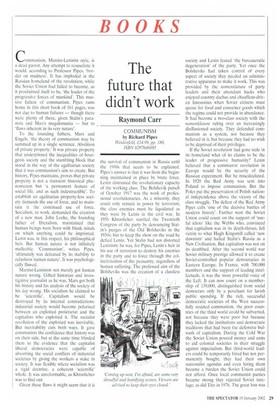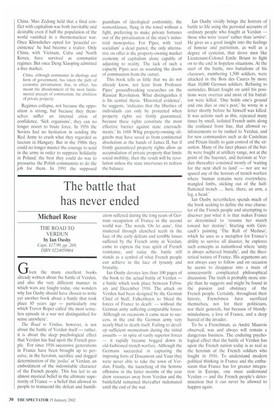The future that didn't work
Raymond Carr
COMMUNISM by Richard Pipes Weidenfeld, £14.99, pp. 180, ISBN 0297646885 the survival of communism in Russia until the 1990s that needs to be explained. Pipes's answer is that it was from the beginning maintained in place by brute force. Lenin distrusted the revolutionary capacity of the working class. The Bolshevik putsch of October 1917 was the work of professional revolutionaries. As a minority, they could only remain in power by terrorism; the class enemies must be liquidated as they were by Lenin in the civil war. In 1956 Khrushchev startled the Twentieth Congress of the party by denouncing Stalin's purges of the Old Bolsheviks in the 1930s; but to keep the show on the road he defied Lenin. Yet Stalin had not distorted Leninism; he was, for Pipes, Lenin's heir in his use of terrorism to destroy his enemies in the party and to force through the collectivisation of the peasantry, regardless of human suffering. The professed aim of the Bolsheviks was the creation of a classless society and Lenin feared the bureaucratic degeneration' of the party. Yet once the Bolsheviks had taken control of every aspect of society they needed an administrative apparatus to make it work. This was provided by the nomenklatura of party leaders and their attendant hacks who enjoyed country dachas and chauffeur-driven limousines when Soviet citizens must queue for food and consumer goods which the regime could not provide in abundance. It had become a two-class society with the nomenklatura ruling over an increasingly disillusioned society. They defended communism as a system, not because they believed in it, but because they had no wish to be deprived of their privileges.
If the Soviet revolution had gone stale in its homeland what of its claims to be the leader of progressive humanity? Lenin believed that a communist revolution in Europe would be the security of the Russian experiment. But he miscalculated. In 1920 the Red Army was sent into Poland to impose communism. But the Poles put the preservation of Polish national independence above the victory of the class struggle. The defeat of the Red Army Pipes calls 'one of the decisive battles of modern history'. Farther west the Soviet Union could count on the support of 'useful idiots' like the Webbs who, convinced that capitalism was in its death-throes, fell victim to what Hugh Kingsmill called 'new dawnism' and hailed Stalin's Russia as a New Civilisation. But capitalism was not on its deathbed. After the second world war Soviet military prestige allowed it to create Soviet-controlled popular democracies in Eastern Europe. In France, with 700.000 members and the support of leading intellectuals, it was the most powerful voice of the Left. It can now count on a membership of 139,000, distinguished from social democrats only by a penchant for lavish public spending. If the rich, successful democratic societies of the West successfully resisted communism, the poor countries of the third world could be subverted, not because they were poor but because they lacked the institutions and democratic traditions that had been the defensive bulwark of capitalism. During the Cold War the Soviet Union poured money and arms to aid colonial societies in their struggle against imperialism. But third-world leaders could be temporarily hired but not permanently bought; they had their own nationalist agendas and even hiring them became a burden the Soviet Union could not afford. Once local communist parties became strong they rejected Soviet tutelage, as did Tito in 1976. The great loss was China. Mao Zedong held that a final conflict with capitalism was both inevitable and desirable even if half the population of the world vanished in a thermonuclear war. Once Khrushchev opted for 'peaceful coexistence' he had become a traitor. Only China, with Vietnam, Cuba and North Korea, have survived as communist regimes. But once Deng Xiaoping admitted a free market,
China, although communist in ideology and form of government, has taken the path of economic privatisation: that, in effect, has meant the abandonment of the most fundamental precept of communism, the abolition of private property.
Regimes collapse, not because the opposition is strong, but because they themselves suffer an internal crisis of confidence. 'Sick organisms', they can no longer resort to brute force. In 1956 the Soviets had no hesitation in sending the Red Army to crush what they regarded as fascism in Hungary. But in the 1980s they could no longer muster the courage to send in the army in order to suppress Solidarity in Poland: the best they could do was to pressurise the Polish communists to do the job for them. In 1991 the supposed
guardians of ideological conformity, the nomenklatura, flung in the towel without a fight, preferring to make private fortunes out of the privatisation of the state's industrial monopolies. For Pipes, with 'real socialism' a dead parrot, the only alternative on offer is the property-owning market economy of capitalism alone capable of adjusting to reality. The lack of such a capacity Pipes sees as sounding the doom of communism from the outset.
This book tells us little that we do not already know, not least from Professor Pipes' groundbreaking researches on the Russian Revolution. What distinguishes it is his central thesis. 'Historical evidence', he suggests, 'indicates that the liberties of individuals can only be protected when property rights are firmly guaranteed, because these rights constitute the most effective barrier against state encroachments.' In 1688 Whig property-owning oligarchs may have saved us from continental absolutism at the hands of James II, but if firmly guaranteed property rights allow an accumulation of private property that limits social mobility, then the result will be revolution unless the state intervenes to redress the balance.































































 Previous page
Previous page